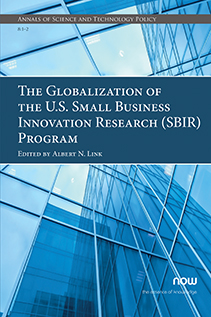Korea Small Business Innovation Research (KOSBIR)
By Irineu de Souza Lima Júnior, University of Campinas, Brazil | Soo J. Sohn, Science and Technology Policy Institute (STEPI), South Korea | Nicholas S. Vonortas, The George Washington University, USA, vonortas@gwu.edu
Abstract
The foreign exchange crisis in 1997 also led the Korean government to pursue economic revitalization, and part of the strategy was to improve the global competitiveness of local SMEs. Korea was the first East Asian country to establish, in 1998, a research and development (R&D) support program focused on small and medium-sized enterprises (SMEs) sculpted on the Small Business Innovation Research (SBIR) program in the United States. The Korea Small Business Innovation Research (KOSBIR) was created in the context of an internationalization policy and open economy movement in the 1990s, followed by the Korean membership in the OECD. The KOSBIR program is reviewed in this monograph.
The Globalization of the U.S. Small Business Innovation Research (SBIR) Program
The Globalization of the U.S. Small Business Innovation Research (SBIR) Program presents how SBIR programs have spread across the globe. The U.S. SBIR program has become a template for legislation in other countries that seek to enhance the innovative nature of small firms. This special issue presents works by leading eminent scholars who describe individually the population of international emulated programs. The works are ordered by the date that the country adopted an SBIR-like program, including Turkey (1995), Australia (1996), Brazil (1997), South Korea (1998), Japan (1999), Taiwan (1999), United Kingdom (2001), The Netherlands (2004), and New Zealand (2012).

Companion
Annals of Science and Technology Policy, Volume 8, Issue 1-2 Special Issue: The Globalization of the U.S. Small Business Innovation Research (SBIR) Program
See the other articles that are also part of this special issue.